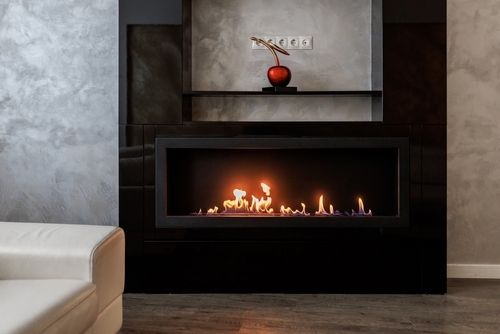
Written on: February 24, 2025
 We’ve always gotten some colder temperatures here in Chatham County, but winter weather has gotten a lot more unpredictable. And deeper cold, even for short periods, can put a strain on heating systems. Lots of customers come to us looking for ways to add supplemental heat—and while they love the idea of a gas fireplace, they have questions about efficiency. After all, a good amount of the heat produced by a traditional wood-burning fireplace goes right up the chimney.
We’ve always gotten some colder temperatures here in Chatham County, but winter weather has gotten a lot more unpredictable. And deeper cold, even for short periods, can put a strain on heating systems. Lots of customers come to us looking for ways to add supplemental heat—and while they love the idea of a gas fireplace, they have questions about efficiency. After all, a good amount of the heat produced by a traditional wood-burning fireplace goes right up the chimney.
We are always happy to tell them that a propane fireplace is four to five times more efficient than a wood-burning hearth.
A big reason a propane gas log set is more efficient than a wood fire is the chimney—or lack thereof. A wood fire needs a chimney to burn safely, but as much as 90 percent of the heat is sucked up the chimney along with smoke and combustion gases. With direct vent or ventless propane options, all the heat stays in the room instead of going up the chimney.
A direct-venting propane hearth only needs a single dual-chambered pipe through a wall to the outdoors. The pipe simultaneously draws air for the fire from the outdoors while expelling the fire’s combustion byproducts to the outside.
Ventless models use a regulator to produce a fine gas-air mix, allowing the gas to burn cleanly without a chimney or a flue.
A wood fire requires nearly constant attention. You need to add logs and poke embers to prevent the fire from dying down and keep your room warm. With today’s propane logs, a remote control and a thermostat let you dial up the heat you want—which is great not only for controlling temperature but for controlling your propane use. Those electric igniters are also more efficient than a standing pilot light.
Another feature you don’t get with a wood fireplace is multispeed blowers that push warm air into the room, providing better, more even heat—especially in larger spaces like great rooms.
Lastly, they let you spend time enjoying moments with family and friends, not tending a fire—how efficient is that?
Another question we often hear is about how much propane a gas fireplace uses. And of course, it depends on a lot of factors: If you use your fireplace every night, you’ll use more propane than if you just light it on weekends. If your home is well-insulated, you may not need to turn it up as high—or as often—if you need supplemental heat. But, as a general rule, if you have a 100,000 Btu fireplace, you’ll use about a gallon of propane for every hour that you run it.
Stop by our showroom and let the team at PFM show you how easy and affordable installing a propane fireplace can be. Contact us for more information today.